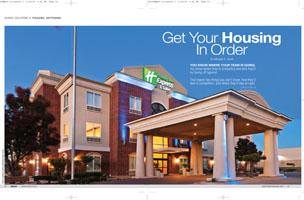
 |
| Photo courtesy of InterContinental Hotels Group |
You know where your team is going. You know where they’re competing and who they’ll be facing off against.
That leaves two things you don’t know: How they’ll fare in competition, and where they’ll stay at night.
We can’t help your team win (though we certainly wish them well), but when it comes to the issue of where you’ll unpack your suitcases, we have a question of our own: What are you waiting for?
Lodging is one of the most important decisions you can make for a sports event. How well-rested your team is will directly affect its performance. It will also reflect on you as a manager, which may be one reason people have, well, reservations about making reservations.
Actually, your choices aren’t that difficult. All you need to do, first, is line up your information, and second, decide whether you want to negotiate with a hotel directly, or use professional assistance.
 The Groundwork
The Groundwork
Develop a Request For Proposal, or RFP, a document describing your event and your needs. This provides a ‘snapshot’ view of the business you will be bringing to the area.
A good RFP should contain a description of your group, the dates you’ll need (check-in and check-out dates), the number of rooms you’ll need and how they should be configured (more on this later). The RFP should describe what you’re looking for in a property in order to prevent miscommunications.
Housing Services
At this point, you have two choices as to how to proceed. The first option is working with a housing service. A housing service is a company whose job it is study the needs of groups, particularly large groups, and find appropriate lodging for them in a given area.
What are the advantages of working with such a service? Plenty: a housing service knows the hotels in the city you’re visiting, and they know the ones in your budget. They also know where those hotels are in relation to your venue (the stadium, ballpark, natatorium, tennis center or wherever your event is) and whether those hotels are convenient to other attractions.
 A housing service makes regular inspections of the hotels in its areas and makes sure they maintain a specific level of quality. They’ll be able to tell you what amenities the place has and how it’s laid out. In short, they can be your eyes and ears in a city you’ve never seen.
A housing service makes regular inspections of the hotels in its areas and makes sure they maintain a specific level of quality. They’ll be able to tell you what amenities the place has and how it’s laid out. In short, they can be your eyes and ears in a city you’ve never seen.
It is in a housing service’s best interest to keep event owners happy, so they will book the hotel on your group's behalf, and keep the hotel updated on new registrations, drop-outs, etc. (All you have to do is make sure they always have the most current information). Because they are more familiar with the market and work with the hotels regularly, they know what similar hotels normally charge. This allows them to negotiate for the lowest possible rates more consistently.
Sometimes, the clout a housing service has makes a big difference. A number of years ago, we were planning a big soccer tournament. The tournament was set for November, but in September, a hurricane hit the area. When clean-up started, the Federal Emergency Management Agency (FEMA) workers began arriving and taking up space in the area's hotels.
As the soccer tournament approached, the hotels were reminded they’d signed a contract with the housing service, and that it therefore was their responsibility to find new places for the FEMA workers to stay so that the soccer players could move in. Since no hotel can afford to alienate a housing service, the soccer players were given special attention. They were able to come in and have their tournament as scheduled. Would it have happened if people had made reservations individually through some budget travel site? Maybe, maybe not. It wouldn’t have been a chance I'd have wanted to take, had I been a coach.
Sometimes, a national tournament will already have a relationship with a housing service, and will put participating teams in contact with it. If that is not the case, the CVB or sports commission in the area can help point you in the direction of a housing service.
If, however, your team is attending an event where no housing service is being used, there are still options. If your team has worked with a housing service for another event in another city, that service may very well be able to negotiate on your team’s behalf for the new location.
 The Direct Approach
The Direct Approach
Maybe you have made the decision to work directly with a hotel. This can work well, provided you are willing to do the research. Remember that anything can look good in a travel brochure or, these days, on the Internet. It’s up to you to find out if it’s the right place for your team.
Hotels come in various levels: budget, moderate, first-class and deluxe, as well as extended stay properties. The size of the rooms, quality of accommodations, amenities offered and so forth will be the dividing lines between any of these levels. The nightly rate may not be the best indicator of quality, so check carefully.
If you are negotiating with a hotel, ask if breakfast is included. This is something that has become vitally important to travelers, and sports teams are no exception. The definition of a breakfast can vary, though. A breakfast may be continental (toast, fruit, juice, coffee, etc.) or it may be a more expanded continental with some hot items. A full breakfast will have a chef who can cook waffles or eggs to order. A full breakfast buffet may have a variety of hot and cold items on it. Something to beware is a boxed or ‘ready-to-go’ breakfast, which might contain a muffin and a small plastic cup of juice. Trust me when I say you’ll hear complaints.
Another talking point is the layout of the hotel. Are the rooms accessed from an interior hallway, or does each room door lead outside? There is a distinct preference in the industry for interior doors (better safety and security, particularly when dealing with underage participants).
Near the beginning of this article, I mentioned room configurations. One popular option, especially among teams who want to conserve a little money, is a room with two double beds as well as a sofa bed. This allows more people to use each room comfortably.
Wi-fi used to be an upscale amenity. These days, it’s almost standard, but applications vary widely among hotels. Ask whether wi-fi is free, or available at a cost. If there is a cost, find out whether that cost is per day, per person, per device, etc. You may be able to negotiate these charges down, but only if you start early.
Location is essential: Find out how far the property is from where your team needs to be. Ask for specifics. What is the distance and how long does it take in heavy traffic? How close is the hotel to restaurants, particularly those able to accommodate large groups? Are stores nearby for both souvenir shopping and necessities?
Does the hotel have parking for buses? Is there a swimming pool (and is it indoors or out)? Is there a restaurant or snack bar? How about a fitness center (and what does it include?) Are there facilities for guest laundry? Can the hotel accept checks? Have all your questions answered before you sign a contract.
I know what you’re thinking: “I’ll just go to an Internet travel and hotel site.” But before you point and click, consider this: there’s a lot out there in cyberspace, and not all of it is reliable data. A website won't be able to do the apologizing for you if you wind up in a substandard hotel, too far from your tournament for easy travel. Find an impartial source (not a budget travel website with a cute mascot) and do actual research.
Plan ahead. You can do it yourself (carefully), or you can take advantage of resources offered by housing services, travel agencies, event planners and others in the hospitality industry. Either way, you'll have a great place to land, and you'll come out a winner.

